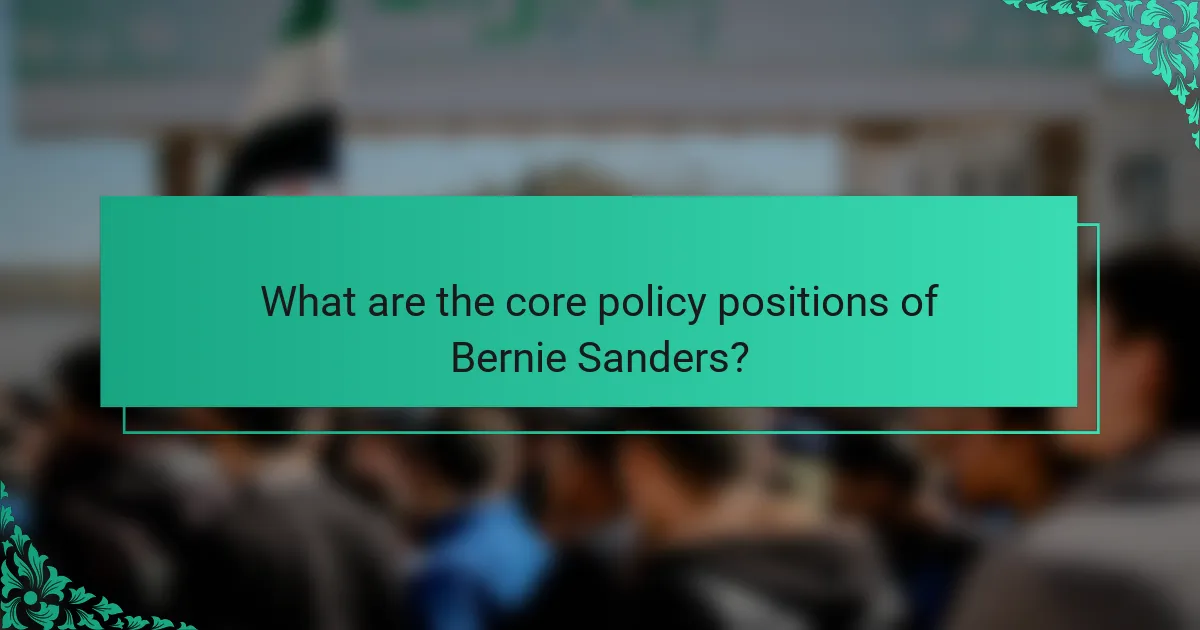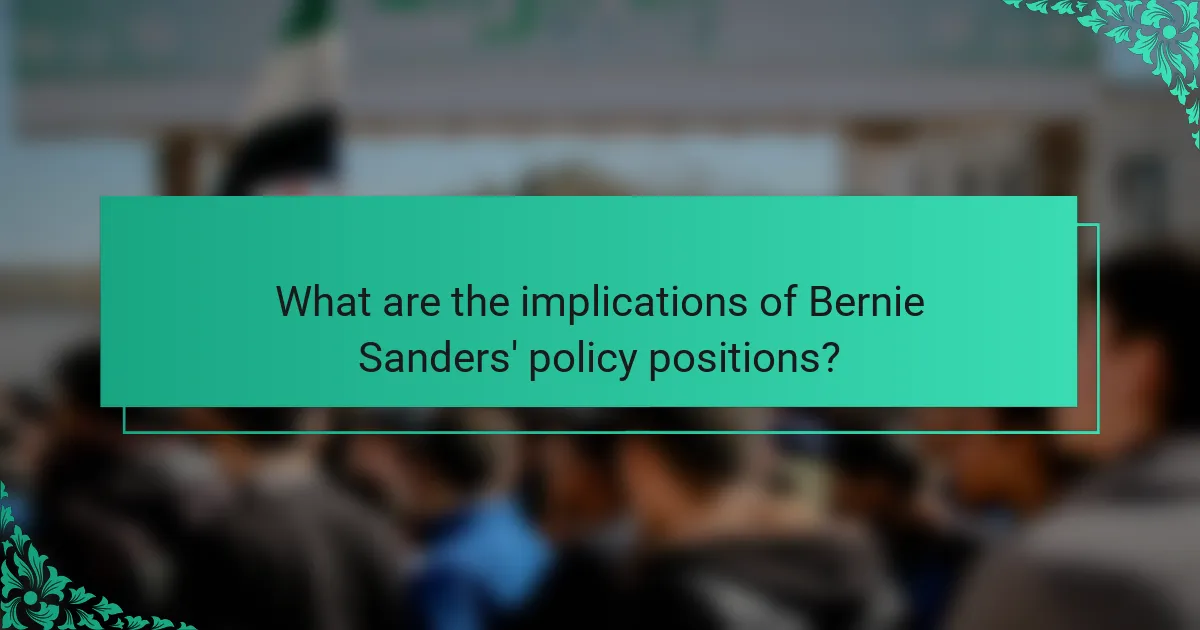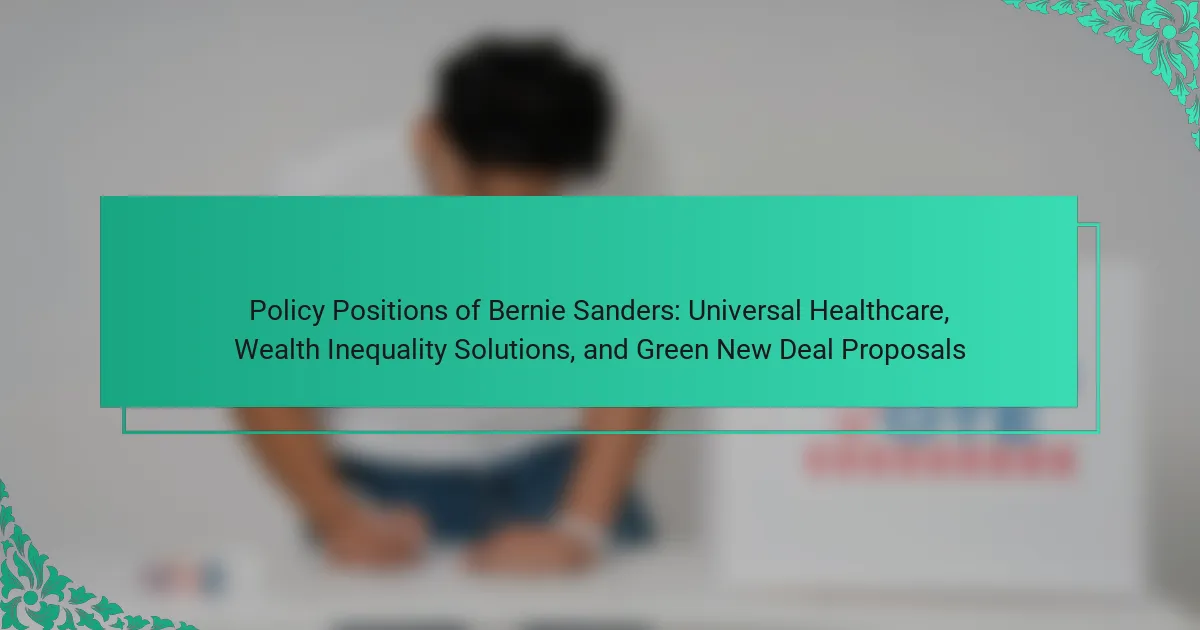Bernie Sanders is a prominent political figure known for his advocacy of universal healthcare, wealth inequality solutions, and climate change initiatives. His core policy positions include the proposal for Medicare for All, which aims to ensure healthcare access for every American, and raising the minimum wage to $15 per hour to address income disparity. Additionally, Sanders supports a wealth tax on the ultra-rich to fund essential social programs and champions the Green New Deal, focusing on combating climate change while creating jobs in renewable energy. These interconnected policies emphasize economic justice and environmental sustainability, aiming to transform American socioeconomic structures for a more equitable future.

What are the core policy positions of Bernie Sanders?
Bernie Sanders’ core policy positions include universal healthcare, wealth inequality solutions, and climate change initiatives. He advocates for Medicare for All, aiming to provide healthcare to every American. Sanders supports raising the minimum wage to $15 per hour to address income inequality. He also proposes a wealth tax on the ultra-rich to fund social programs. Additionally, Sanders champions the Green New Deal to combat climate change and create jobs in renewable energy. His policies focus on economic justice and environmental sustainability.
How does Bernie Sanders define universal healthcare?
Bernie Sanders defines universal healthcare as a system that guarantees healthcare coverage for all citizens. He advocates for a single-payer healthcare system, often referred to as “Medicare for All.” This system aims to eliminate out-of-pocket costs for patients. Sanders emphasizes that healthcare is a human right. He argues that no one should go bankrupt due to medical expenses. According to Sanders, the government should fund healthcare through progressive taxation. This approach would ensure that everyone has access to necessary medical services. His proposal aims to improve overall public health and reduce healthcare costs for families.
What are the key features of Sanders’ universal healthcare plan?
Sanders’ universal healthcare plan aims to provide comprehensive healthcare coverage for all Americans. It eliminates private insurance, transitioning to a single-payer system. This plan covers all medical services, including hospital visits, doctor visits, and preventive care. Patients would not face out-of-pocket costs for medical services. Funding would come from increased taxes on the wealthy and corporations. The plan aims to lower overall healthcare spending in the long term. It also emphasizes the importance of prescription drug affordability and mental health services. This approach is designed to ensure equitable access to healthcare for every citizen.
How would universal healthcare impact American citizens?
Universal healthcare would significantly improve access to medical services for American citizens. It would eliminate financial barriers, allowing individuals to seek care without the fear of high costs. Studies indicate that countries with universal healthcare have better health outcomes. For example, the Commonwealth Fund reports that nations with such systems experience lower infant mortality rates and higher life expectancy. Additionally, universal healthcare could reduce overall healthcare spending for families. The Congressional Budget Office estimates savings of up to $2 trillion over a decade. Overall, universal healthcare would enhance public health and financial security for American citizens.
What solutions does Bernie Sanders propose for wealth inequality?
Bernie Sanders proposes several solutions to address wealth inequality. He advocates for a progressive tax system that increases taxes on the wealthy. Sanders supports a wealth tax on billionaires to redistribute wealth more equitably. He proposes raising the minimum wage to $15 per hour to ensure a living wage for all workers. Additionally, he calls for strengthening labor rights to empower workers and promote unionization. Sanders emphasizes the need for affordable healthcare and education to reduce financial burdens on families. His policies aim to create a fairer economy and reduce the wealth gap.
What are the main factors contributing to wealth inequality according to Sanders?
The main factors contributing to wealth inequality according to Sanders are corporate greed, tax policies favoring the wealthy, and lack of access to quality education. Corporate greed leads to wage stagnation for workers while profits soar for executives. Tax policies often benefit the richest individuals and corporations, exacerbating the wealth gap. Additionally, limited access to quality education restricts economic mobility for lower-income families. Sanders emphasizes that these issues create systemic barriers, preventing equitable wealth distribution.
How does Sanders plan to address these factors?
Sanders plans to address these factors through comprehensive policy reforms. He advocates for a Medicare for All system to ensure universal healthcare access. This approach aims to eliminate out-of-pocket expenses for patients. Additionally, Sanders proposes increasing taxes on the wealthiest Americans to reduce wealth inequality. He supports a Green New Deal to combat climate change and create green jobs. This initiative focuses on transitioning to renewable energy sources. Sanders emphasizes the importance of affordable housing in his economic policies. He aims to implement policies that promote living wages and workers’ rights. These strategies collectively target systemic issues affecting healthcare, wealth distribution, and environmental sustainability.
What is the Green New Deal and how does Bernie Sanders support it?
The Green New Deal is a proposed framework to address climate change and economic inequality. It aims to transition the U.S. to 100% renewable energy while creating millions of jobs. The initiative emphasizes sustainable infrastructure and green technology. Bernie Sanders supports the Green New Deal by advocating for comprehensive legislation to combat climate change. He emphasizes the need for bold action to reduce greenhouse gas emissions. Sanders has introduced proposals that align with the Green New Deal, including investments in renewable energy. He argues that addressing climate change is a moral imperative. His support includes promoting green jobs and ensuring a just transition for affected workers.
What are the primary goals of the Green New Deal?
The primary goals of the Green New Deal are to address climate change and economic inequality. It aims to transition the United States to 100% renewable energy by 2030. This includes investing in green infrastructure and creating millions of jobs in the clean energy sector. The Green New Deal also seeks to promote social justice by ensuring that marginalized communities benefit from these initiatives. Additionally, it emphasizes the importance of sustainable agriculture and reducing greenhouse gas emissions. These goals reflect a comprehensive approach to tackling environmental and economic challenges simultaneously.
How does the Green New Deal align with Sanders’ overall policy vision?
The Green New Deal aligns closely with Sanders’ overall policy vision by emphasizing social justice and environmental sustainability. Sanders advocates for comprehensive climate action as part of his broader progressive agenda. The Green New Deal aims to achieve net-zero greenhouse gas emissions by 2030, a goal Sanders supports. It also seeks to create millions of jobs in renewable energy sectors, aligning with Sanders’ focus on economic equality. Additionally, the Green New Deal addresses systemic inequalities, which is a key component of Sanders’ platform. By promoting a transition to a green economy, it reflects his commitment to combating both climate change and wealth inequality.

What connections exist between Sanders’ policies?
Sanders’ policies are interconnected through their focus on economic equity and social justice. Universal healthcare aims to provide accessible medical services for all, reducing financial burdens on individuals. Wealth inequality solutions, such as progressive taxation, seek to redistribute wealth and fund social programs. The Green New Deal addresses climate change while creating jobs, linking environmental sustainability to economic growth. Each policy reinforces the others by promoting a fairer society. For example, improved healthcare can lead to a healthier workforce, enhancing productivity. Overall, these policies collectively strive for a more equitable and sustainable future.
How do universal healthcare and wealth inequality solutions intersect?
Universal healthcare and wealth inequality solutions intersect through their shared goal of promoting social equity. Universal healthcare aims to provide access to medical services for all individuals, regardless of income. This access reduces financial burdens on low-income populations, addressing one aspect of wealth inequality.
Wealth inequality solutions often focus on redistributing resources to ensure that all individuals can meet basic needs, including healthcare. Studies show that countries with universal healthcare systems tend to have lower levels of wealth inequality. For example, nations like Sweden and Norway have implemented universal healthcare alongside policies that reduce wealth gaps.
Research indicates that improving healthcare access can lead to increased economic productivity. Healthier individuals are more capable of contributing to the economy, which can help alleviate wealth inequality. Thus, universal healthcare can be seen as a foundational element in broader strategies to address wealth disparities.
What role does the Green New Deal play in addressing wealth inequality?
The Green New Deal aims to address wealth inequality by promoting economic opportunities for low-income communities. It emphasizes job creation in renewable energy sectors. The initiative seeks to ensure that disadvantaged groups benefit from the transition to a green economy. Research indicates that investing in clean energy can create millions of jobs. A 2020 report by the Political Economy Research Institute found that a Green New Deal could create approximately 20 million jobs. Additionally, the Green New Deal includes provisions for equitable access to resources and technology. This approach seeks to reduce disparities in wealth and access to economic opportunities. By prioritizing marginalized communities, the Green New Deal addresses systemic inequalities.

What are the implications of Bernie Sanders’ policy positions?
Bernie Sanders’ policy positions imply significant shifts in American socioeconomic structures. His advocacy for universal healthcare aims to provide accessible medical services to all citizens. This could reduce overall healthcare costs and improve public health outcomes. Sanders’ focus on wealth inequality solutions seeks to redistribute wealth through progressive taxation. This approach could narrow the wealth gap and enhance economic mobility for lower-income families. Additionally, his Green New Deal proposals target climate change through sustainable job creation and renewable energy investments. This could lead to a more resilient economy and reduced carbon emissions. Overall, Sanders’ policies suggest a transformative impact on healthcare, economic equality, and environmental sustainability in the U.S.
How might these policies reshape the American political landscape?
These policies could significantly alter the American political landscape. Universal healthcare may increase support for progressive candidates. It addresses a fundamental need, appealing to a broader electorate. Wealth inequality solutions could mobilize younger voters seeking economic fairness. This demographic shift may lead to increased voter turnout. The Green New Deal aims to tackle climate change, resonating with environmentally conscious citizens. This could create a coalition of diverse groups advocating for systemic change. Historical shifts show that major policy proposals often reshape party alignments and voter bases. For example, the New Deal in the 1930s transformed the Democratic Party’s identity and support.
What challenges could Sanders face in implementing his policies?
Sanders could face significant challenges in implementing his policies. Political opposition is a primary obstacle. Many lawmakers oppose his progressive agenda. This opposition could lead to legislative gridlock. Public opinion can also be a challenge. Some voters may not support his proposals. Economic factors may hinder implementation as well. Funding large-scale initiatives like universal healthcare is complex. The need for bipartisan support is crucial for success. Historical precedents show that ambitious reforms often encounter resistance.
How do public opinions influence the feasibility of these policies?
Public opinions significantly influence the feasibility of policy proposals. When a majority of the public supports a policy, lawmakers are more likely to advocate for it. For example, polls show that a majority of Americans favor universal healthcare. This widespread support creates political pressure on elected officials to act. Conversely, if public opinion is largely negative, policies may face significant opposition. Historical examples include the Affordable Care Act, which passed due to strong public backing. Additionally, public opinion can shape media narratives, affecting how policies are perceived. Engaged citizens can also mobilize movements that demand policy changes, further influencing feasibility.
What practical steps can citizens take to support these policy positions?
Citizens can support these policy positions by actively participating in advocacy efforts. They can join local organizations that promote universal healthcare, wealth inequality solutions, and green initiatives. Engaging in community discussions raises awareness and builds support. Citizens can also contact their elected representatives to express support for these policies. Attending town hall meetings allows for direct dialogue with policymakers. Volunteering for campaigns that align with these positions amplifies their impact. Additionally, citizens can educate themselves and others about the benefits of these policies. Sharing information on social media helps spread awareness and mobilize support. By voting for candidates who prioritize these issues, citizens can influence policy change effectively.
The main entity of the article is Bernie Sanders and his core policy positions, which focus on universal healthcare, solutions for wealth inequality, and the Green New Deal. The article outlines Sanders’ advocacy for a single-payer healthcare system, progressive taxation to address income disparities, and comprehensive climate change initiatives aimed at creating jobs in renewable energy. Key features of his policies include eliminating out-of-pocket healthcare costs, raising the minimum wage, and promoting sustainable infrastructure. Additionally, the article examines the interconnectedness of these policies and their potential impact on American society and the political landscape.
